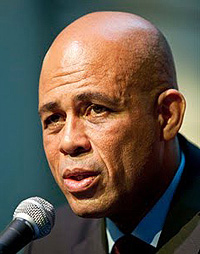PORT-AU-PRINCE/ MIAMI, (Reuters) – As the carnival music star “Sweet Micky”, Haiti’s shaven-headed Michel Martelly captivated audiences with an engaging style, provocative on-stage antics and satirical lyrics.

As president, he will have to lift up a country prostrated by a 2010 earthquake and decades of poverty and corruption, chained to foreign aid and mined by explosive politics.
This will require a performance of a lifetime from a 50-year-old iconoclastic entertainer and political outsider with no government experience who won a landslide run-off victory, according to preliminary results on Monday.
These results are subject to possible legal challenges before they can be declared definitive later in April.
“Martelly has asked Haitians to take a tremendous leap of faith that he can transform himself from entertainer to national leader,” said Robert Maguire, director of the Haiti Program at Trinity University in Washington.
“Apparently, a significant majority of voters are willing to give him that chance,” he added.
Analysts believe the margin of Martelly’s victory — nearly 68 percent of the March 20 vote compared to just under 32 percent for his rival, former first lady Mirlande Manigat — will head off the threat of violent protests against the election outcome.
This is good news for the United Nations, with its more than 12,000-strong peacekeeping mission in Haiti, and for the United States, which does not want an imploding Caribbean state on its doorstep spilling more poor migrants on Florida shores.
Washington welcomed Monday’s results as an “important milestone” for Haiti as it moved to rebuild from the quake.
Martelly’s forceful head-on message promising change — hammered home by his Creole campaign slogan “Tet Kale” meaning both “shaved head” and “all the way” — scored with voters.
But he may need a more conciliatory approach as president.
He Can Entertain, But
Can He Negotiate?
Outgoing President Rene Preval’s INITE party, irked by the removal through international pressure amid fraud charges of their candidate from the March 20 run-off, looks set with allies to maintain a dominant position in Haiti’s parliament.
“(Martelly’s) task will be especially difficult since he will have to get support from a Parliament that is chiefly loyal to Preval,” said Michael Shifter, president of the Inter-American Dialogue think tank in Washington.
“The risk of ungovernability is high, so Martelly will have to strike deals, forge alliances and produce results,” he added. The negotiation may have to start immediately, over the choice of prime minister to lead the government.
Martelly, whose on-stage antics as self-styled “President of Konpa”, the catchy Haitian carnival music, has included wearing wigs, diapers and baring his backside, will also need to convince foreign donors that he is a serious interlocutor.
Disaster-prone Haiti is one of the poorest countries in the world and — more than ever after the 2010 earthquake — is dependent on international aid for its development.
Martelly wooed voters with a nationalistic discourse about Haiti “standing on its own feet”, but analysts said he knows his government cannot realistically survive in the near future without development aid and the presence of U.N. peacekeepers.
“The question for Martelly is whether he can renegotiate Haiti’s dependence on better terms,” said Robert Fatton Jr., a professor in the University of Virginia’s Politics Department.
“Nervous” Over The
Novice
Maguire said the international community would be “nervous” about Martelly, a political novice with a showbiz background.
“So he will have to build confidence. Will his government support the action plan for recovery and development that the donors have pledged funds against – or will he want to make significant changes that donors are not comfortable with?”
Law and order is also a major challenge in Haiti, a small but volatile state with a bloody history of upheaval and violence since a slave revolt led to independence from France in 1804. Kidnapping and armed banditry still exist, although at levels greatly reduced by the presence of U.N. peacekeepers.




